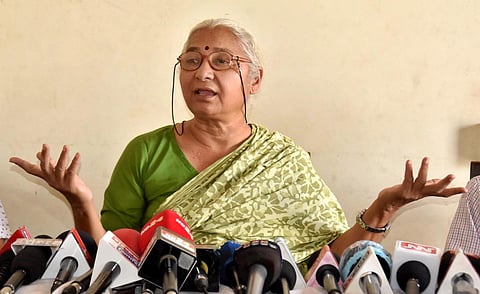

THOOTHUKUDI: Social activists have urged the State government to stop the construction of coal-fired Udangudi super critical thermal power plant in Thoothukudi district citing environmental concerns. Following a visit to the 3,960MW plant, social activist Medha Patkar, one of the founders of the National Alliance of People’s Movements (NAPM), told TNIE on Wednesday that the construction of the plant is being carried out on a huge water catchment area without performing Environmental Impact Assessment (EIA) and obtaining mandatory Environment Clearance (EC).
Patkar alleged that Tangedco authorities had done EIA and got EC only for a previous project to build 800MWx 2 units. No such mandatory preconditions have been met for the revised 660MWx 6 project to upgrade the total capacity of the project from 1,600MW to 3,960MW, she said.
She also accused Tangedco of ignoring Social Impact Assessments (SIA), a precondition mandated under Land Acquisition Act, 2013. The Tamil Nadu government had approved acquisition of 607 hectares of land for the plant. "The SIA should be viewed seriously as pollution from the plant may destroy farming in the region", she said, adding that Udangudi is known for karupatti manufacturing, palm yards, coconut trees, and banana plantation.
Though Tamil Nadu requires 17,000 MW per day, not all 40 TPPs and solar plants in the State are functioning to their full capacity, Patkar said. She appealed to the State government to adopt renewable energy generation practices on a priority basis.
Meanwhile, activist Sundar Rajan, a member of Poovulagin Nanbargal, said thermal power plants are detrimental to the environment because of their emission capacity. There is a lacunae in the EC obtained for the Udangudi plant as the reports do not include study on impact of the plant on water and Gulf of Mannar Marine Biosphere reserve, he said.
Each of the plant’s 660MW capacity units is designed to intake 17 crore litres of seawater per day for coolants, and 70 % of them will be discharged back into the ecological-sensitive Gulf of Mannar. Large volumes of hot water discharged into the sea over years would destroy seagrass, known for carbon sequestration, Rajan said.
As per the Intergovernmental Panel on Climate Change (IPCC) report, the country aims to ensure net zero carbon emission by 2050. Rajan said it is ironic that the first unit of the Udangudi plant is expected to be commissioned in 2025 and all the units would start power generation in 2030, just 20 years ahead of the country’s goal to achieve net zero emission.
Despite several attempts, Tamil Nadu Electricity Minister V Senthil Balaji could not be reached for comments.